A Time to Stand – Conference Recap
The Gospel Reformation Network’s 2019 pre-assembly day conference — “A Time To Stand: Conviction, Courage, and Compassion in an Age of Compromise” — was a tremendous blessing. We are so thankful for our five speakers, and for all who attended, hosted booths, supported prayerfully, assisted financially, and watched via live-stream. It was a wonderful time of encouragement, fellowship, and edification. It was especially encouraging to welcome teaching and ruling elders from various PCA “camps” and to enjoy a day of sweet fellowship together under the ministry of the Word.
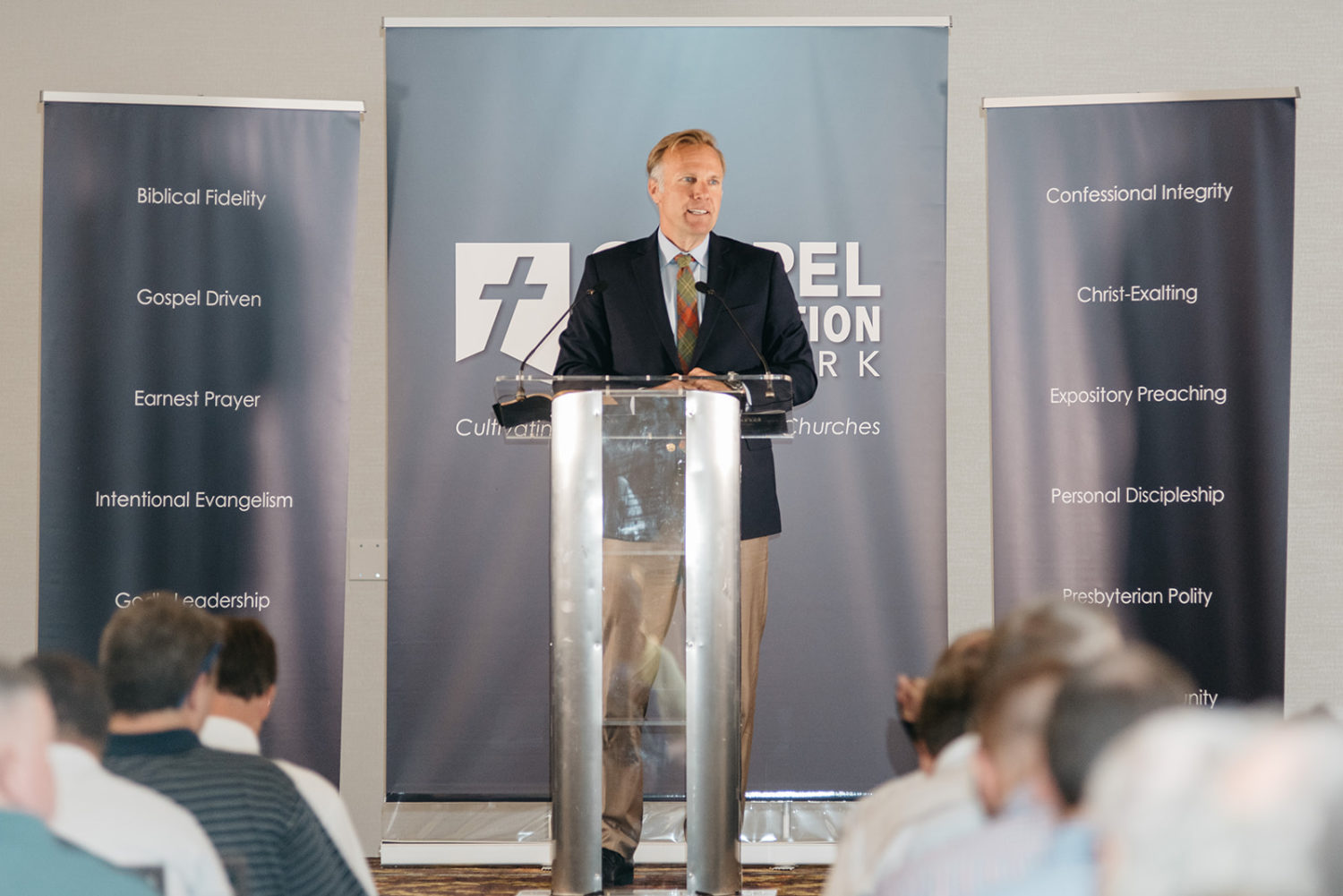 Dr. Jon Payne, the GRN Executive Coordinator, opened the conference with a brief devotional from First John 4 about the love of God, and the love of Christians for one another. He welcomed the attendees and shared that “we are here because we love each other … and we are called to love each other, especially when there are thorny challenges facing us (in the PCA). This isn’t a time to bite and devour one another, but to lovingly, humbly, and in good conscience forthrightly set forth from the Scriptures (and our Confession) the best way forward for the PCA.” Payne also underscored the call to fidelity in the PCA in light of denominational compromise in the past. “We are here because we love the Presbyterian Church in America, and church history teaches us that theological drift in aging denominations is very real. Small, subtle cultural accommodations are often the way the church becomes unmoored from its theological commitments. We are not here to stir up division, but through sound teaching to cultivate clarity and unity around the truth.”
Dr. Jon Payne, the GRN Executive Coordinator, opened the conference with a brief devotional from First John 4 about the love of God, and the love of Christians for one another. He welcomed the attendees and shared that “we are here because we love each other … and we are called to love each other, especially when there are thorny challenges facing us (in the PCA). This isn’t a time to bite and devour one another, but to lovingly, humbly, and in good conscience forthrightly set forth from the Scriptures (and our Confession) the best way forward for the PCA.” Payne also underscored the call to fidelity in the PCA in light of denominational compromise in the past. “We are here because we love the Presbyterian Church in America, and church history teaches us that theological drift in aging denominations is very real. Small, subtle cultural accommodations are often the way the church becomes unmoored from its theological commitments. We are not here to stir up division, but through sound teaching to cultivate clarity and unity around the truth.”
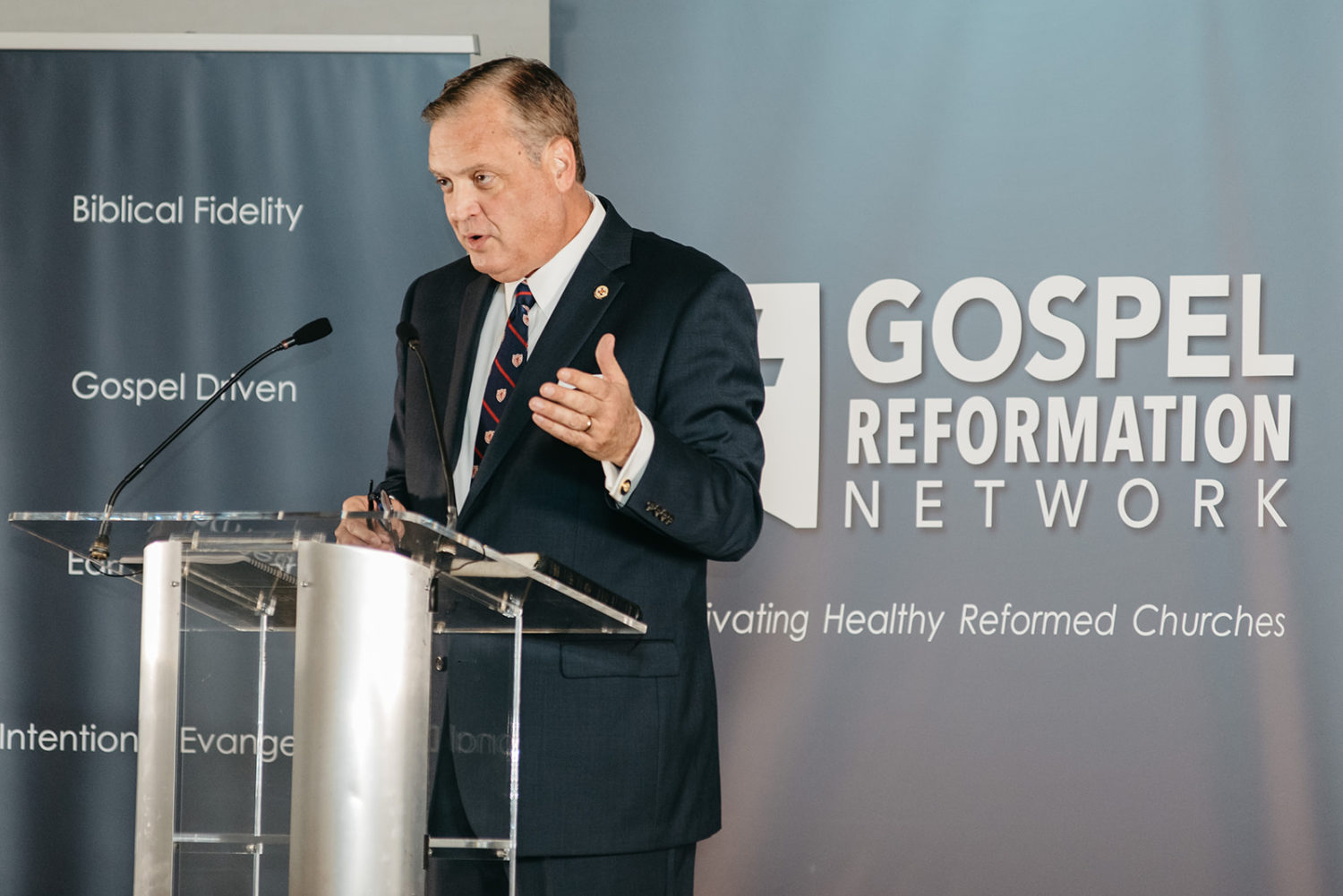 Our first speaker was Dr. Albert Mohler, President of Southern Baptist Theological Seminary. He began by proving the backdrop of the current cultural understanding and vocabulary of sexuality, identity, and autonomy, and how this relates to our theology. “The vocabulary we adopt becomes determinative of what will follow theologically.” The breakdown of the culture attacks the very identity of who we are as human beings made in the image of God. “It takes a lot of cultural breakdown in adults to make them know what they cannot not know about the Imago Dei.” Sex has been divorced from procreation, marriage, and family. Sex then becomes fundamental to identity and one’s self-conceived identity attempts to dethrone ontology. But ontology always trumps autonomy.
Our first speaker was Dr. Albert Mohler, President of Southern Baptist Theological Seminary. He began by proving the backdrop of the current cultural understanding and vocabulary of sexuality, identity, and autonomy, and how this relates to our theology. “The vocabulary we adopt becomes determinative of what will follow theologically.” The breakdown of the culture attacks the very identity of who we are as human beings made in the image of God. “It takes a lot of cultural breakdown in adults to make them know what they cannot not know about the Imago Dei.” Sex has been divorced from procreation, marriage, and family. Sex then becomes fundamental to identity and one’s self-conceived identity attempts to dethrone ontology. But ontology always trumps autonomy.
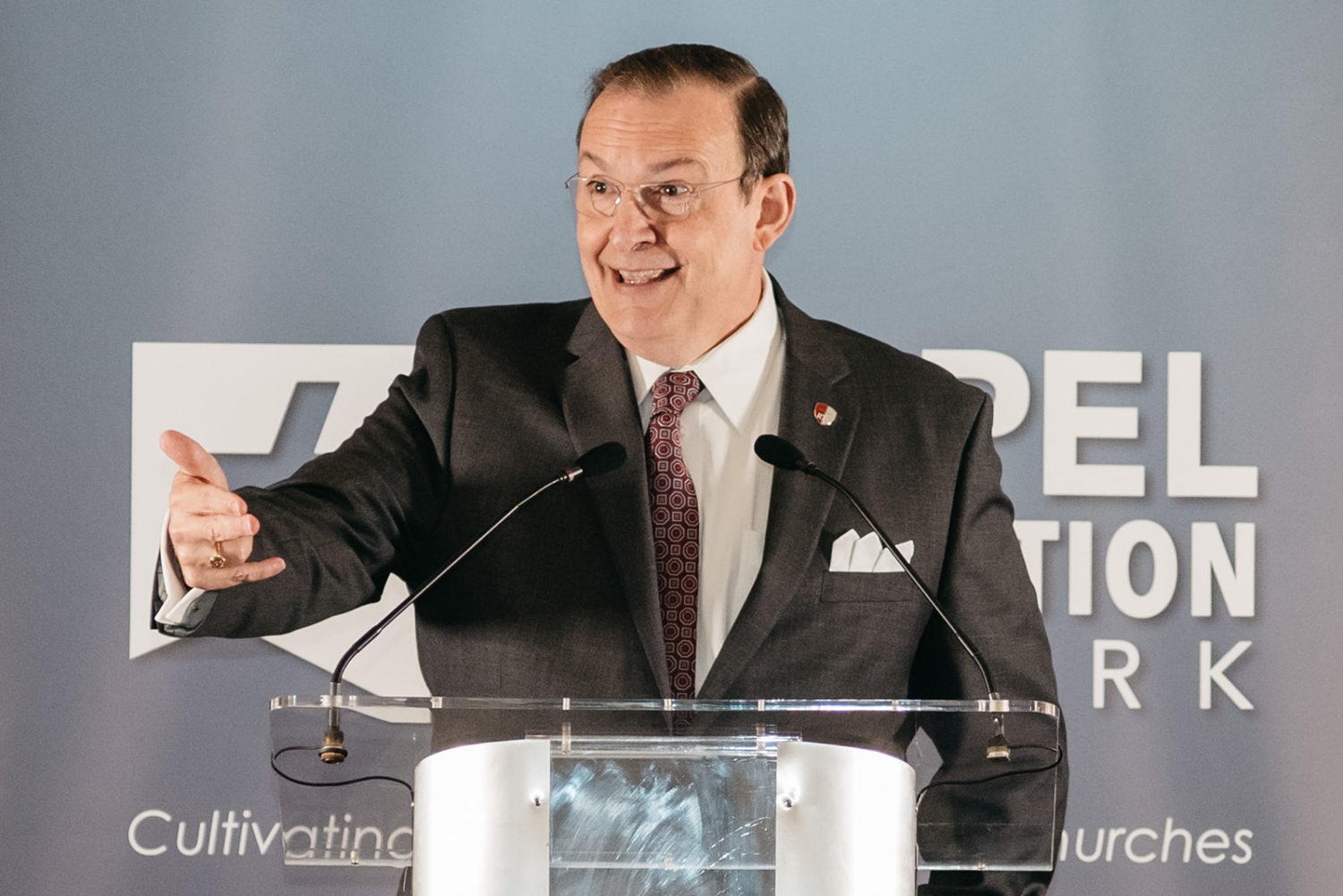 Our second speaker, GRN Council Member and Chancellor of Reformed Theological Seminary, Dr. Ligon Duncan, addressed the conference on the topic of sanctification, especially as it relates to the numerous errors of Revoice. He pointed out that it simply is not true that churches in the PCA cannot draw a line on the issue of human sexuality as an issue, and at the same time lovingly minister to those who struggle with sexual sin. We need to be clear about this issue for the glory of God, the health of the church, and for the sake of the lost who are looking for answers. We owe others clarity. He prefaced this with 7 observations about the Revoice Conference.
Our second speaker, GRN Council Member and Chancellor of Reformed Theological Seminary, Dr. Ligon Duncan, addressed the conference on the topic of sanctification, especially as it relates to the numerous errors of Revoice. He pointed out that it simply is not true that churches in the PCA cannot draw a line on the issue of human sexuality as an issue, and at the same time lovingly minister to those who struggle with sexual sin. We need to be clear about this issue for the glory of God, the health of the church, and for the sake of the lost who are looking for answers. We owe others clarity. He prefaced this with 7 observations about the Revoice Conference.
- To those bad faith critics outside the PCA, who with fiendish delight, declare this is a slide into liberalism and unfaithfulness, Dr. Duncan declares, “Wrong. Not even close.” There has been unified, quiet concern. Almost everybody finds the stance and rhetoric and views of Revoice as problematic.
- There is a paucity of public advocates for Revoice within the PCA. Indeed, there is not a single church session, a single presbytery, or a single institution that has uncritically endorsed Revoice. All have officially distanced themselves from Revoice. None of our sister denominations in NAPARC have endorsed this. All have expressed serious concern.
- Neither of the co-founders of Revoice are ordained in the PCA nor have they been ordained as pastors. And yet, the concerns of Revoice are deeply pastoral in nature. Pastors like to hear about pastoral issues from experienced ministers who have pastored for a long time. Almost none of the speakers at the two Revoice conferences are even ordainable in the PCA. And yet Revoice has been critical of PCA pastors who have been ministering to SSA people in their congregations for years.
- On the matter of “Gay Christian” terminology, there has been a deliberate obfuscation of that term by its proponents.
- Revoice has been strangely silent on the “T” (Transgender) though they regularly use the LGBTQI+ abbreviation. What doesn’t work theological for confessional Christians regarding transgender identity, doesn’t work for the rest of the LGBTGI+ spectrum.
- Revoice posits an us/them relationship. They say, “we are theologians of the cross. They are theologians of glory.” They position themselves between the Pharisees and Sadducees. Duncan warned, “There is always a voice that whispers in our ears, ‘Your case is different. Your circumstances are utterly unique. You are the exception to the rule. No one understands you where you are. And it is never the Holy Spirit that says that. And that is always the first step for permission to walk away from God’s Word. If anyone stands up and says, ‘Your pastor can’t understand you. Only we truly understand you.’ That is a pastoral disaster.”
- Reformed theology is a powerful tool in addressing same-sex attraction.
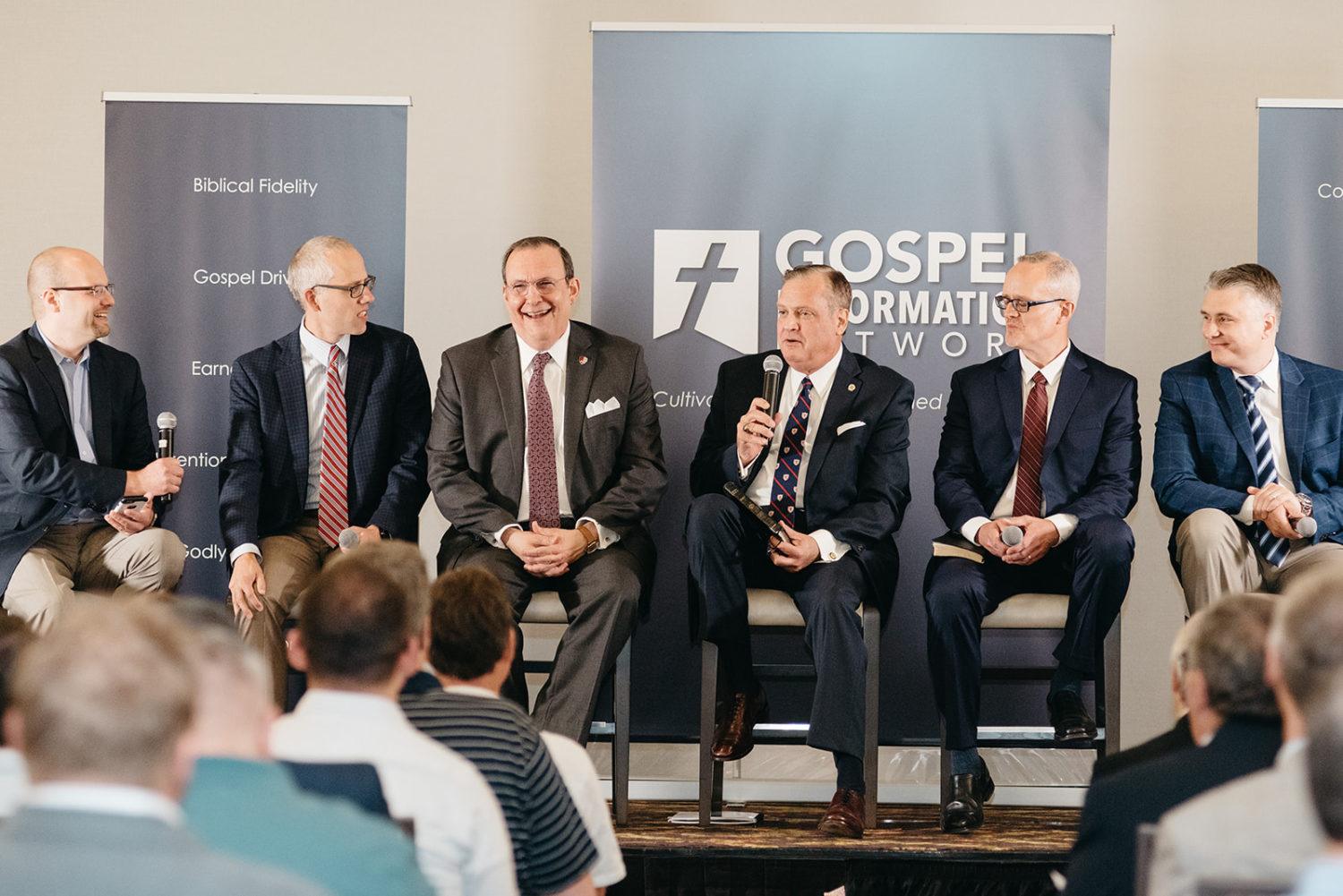 After lunch, where many elders from various viewpoints on these issues were able to sit down and talk, there was a Q&A session with Kevin DeYoung, Ligon Duncan, Al Mohler, Tim Geiger, and David Strain, moderated by GRN Council Member, Jason Helopolus. The discussion ranged from the nature of sin with respect to same-sex attraction, to concupiscence, to the role of shame in repentance, to mortification of sin, to the all-sufficient grace of Jesus Christ. Tim Geiger, President of Harvest USA, made the point that in his life he had to realize that it was sinful to continue to dabble in the gay lifestyle. He needed to embrace the church that would be his new family.
After lunch, where many elders from various viewpoints on these issues were able to sit down and talk, there was a Q&A session with Kevin DeYoung, Ligon Duncan, Al Mohler, Tim Geiger, and David Strain, moderated by GRN Council Member, Jason Helopolus. The discussion ranged from the nature of sin with respect to same-sex attraction, to concupiscence, to the role of shame in repentance, to mortification of sin, to the all-sufficient grace of Jesus Christ. Tim Geiger, President of Harvest USA, made the point that in his life he had to realize that it was sinful to continue to dabble in the gay lifestyle. He needed to embrace the church that would be his new family.
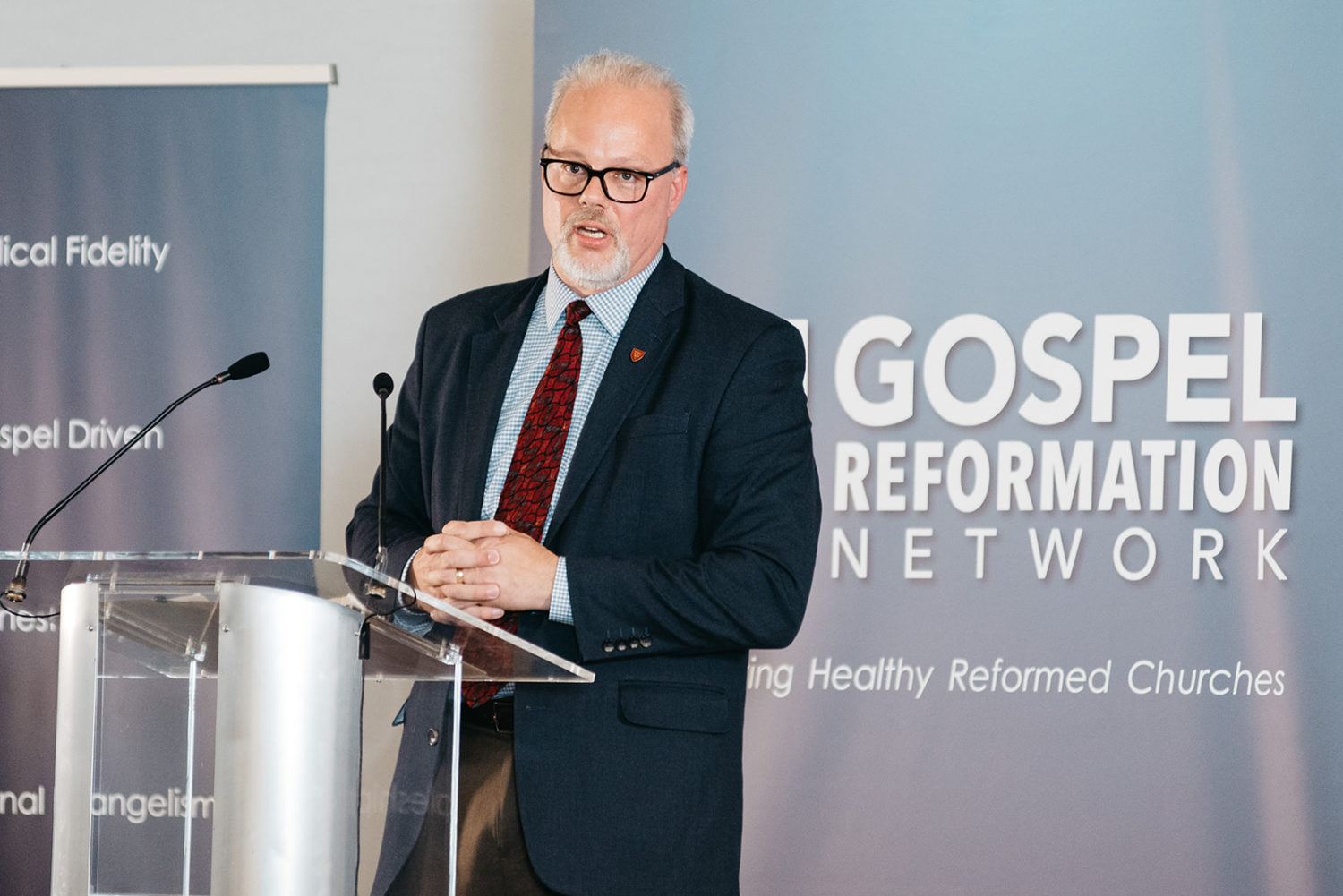 The third message was presented by GRN Council Member, Dr. David Garner. He addressed the notion of contextualization— what it means, what it doesn’t, and how the church can rightly contextualize and evangelize the gospel message without capitulating the truth in light of cultural pressures of the moment. Especially the currently-raging sexual revolution. Dr. Garner’s comments help us to understand how the cultural message is impacting the thinking and perceptions of our church members, and how pastors can help address and respond to this reality.
The third message was presented by GRN Council Member, Dr. David Garner. He addressed the notion of contextualization— what it means, what it doesn’t, and how the church can rightly contextualize and evangelize the gospel message without capitulating the truth in light of cultural pressures of the moment. Especially the currently-raging sexual revolution. Dr. Garner’s comments help us to understand how the cultural message is impacting the thinking and perceptions of our church members, and how pastors can help address and respond to this reality.
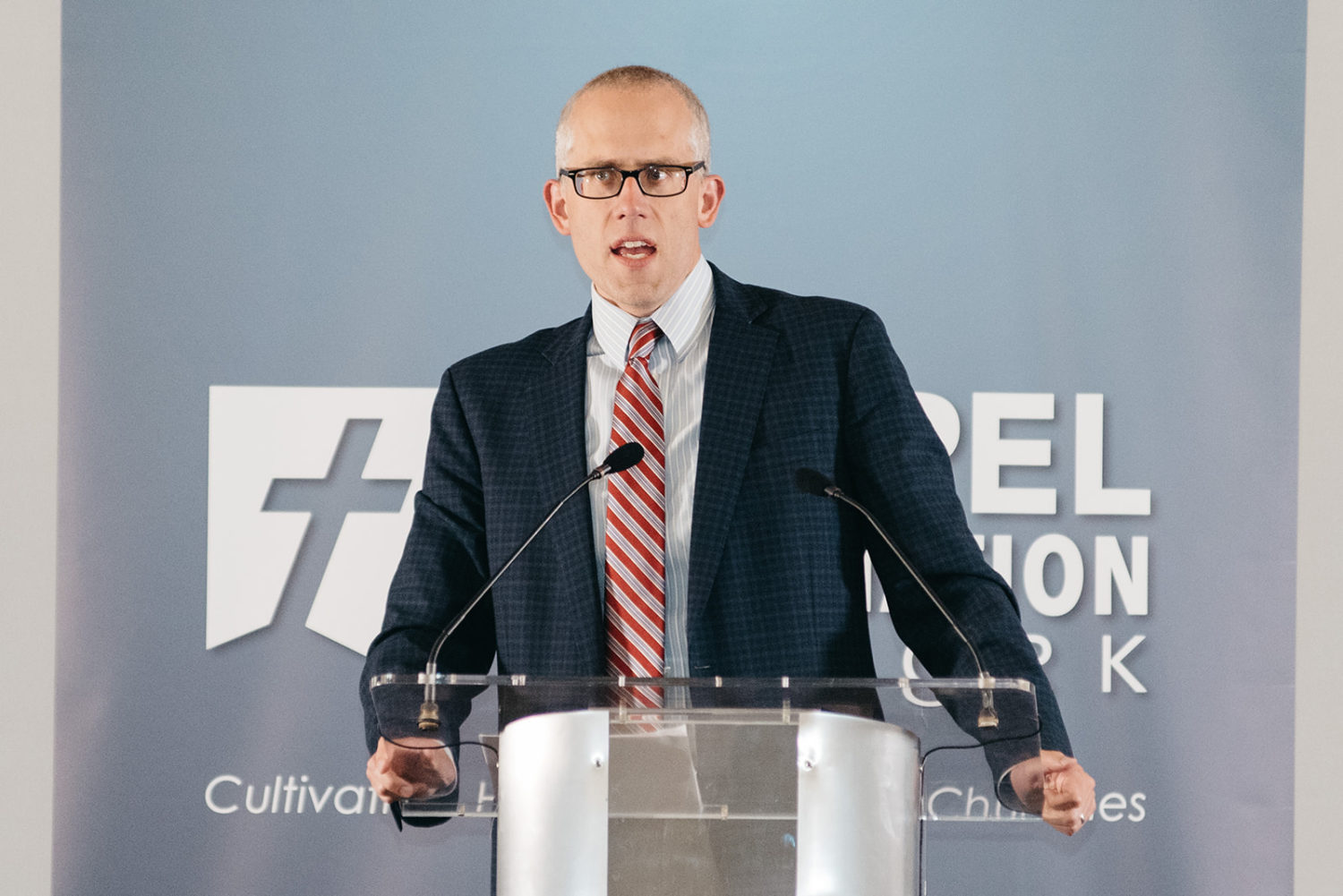 The final session of the conference was an address by Dr. Kevin DeYoung, Pastor of Christ Covenant Church and Associate Professor of Systematic Theology at RTS Charlotte. DeYoung addressed the topic of the nature of sin and temptation. There is a persistent misunderstanding of temptation, specifically same-sex attracted temptation, that it is morally neutral. The misunderstanding posits that that temptation only becomes sin when it is acted upon. This is not a biblical view of temptation. DeYoung addressed this by looking at the Scriptures and John Owen’s seventeenth century classic, Mortification of Sin. Temptation is sometimes distinguished from sin and sometimes identified as sin. Part of the distinction is that temptations from without that are acted upon are sin. Temptations from within are already sin. But there is a great hope for all sinners. “The Gospel says we deserve to be humiliated and shamed for our sin, but Christ came to be humiliated and shamed for our sins. When ministering to the sinner: Do not lessen the sin, exalt the substitute.”
The final session of the conference was an address by Dr. Kevin DeYoung, Pastor of Christ Covenant Church and Associate Professor of Systematic Theology at RTS Charlotte. DeYoung addressed the topic of the nature of sin and temptation. There is a persistent misunderstanding of temptation, specifically same-sex attracted temptation, that it is morally neutral. The misunderstanding posits that that temptation only becomes sin when it is acted upon. This is not a biblical view of temptation. DeYoung addressed this by looking at the Scriptures and John Owen’s seventeenth century classic, Mortification of Sin. Temptation is sometimes distinguished from sin and sometimes identified as sin. Part of the distinction is that temptations from without that are acted upon are sin. Temptations from within are already sin. But there is a great hope for all sinners. “The Gospel says we deserve to be humiliated and shamed for our sin, but Christ came to be humiliated and shamed for our sins. When ministering to the sinner: Do not lessen the sin, exalt the substitute.”
It is our sincere hope that the resources from this conference, A Time to Stand, will be an ongoing benefit to you and your church. Each of the men who presented at the conference sought to find a balance between robust, clear theological truth and winsome, compassionate pastoral sensitivity. We have made the videos available (links are above) and hope that you will view them again. If you are encouraged or helped by them, please pass them along through your social media accounts and consider supporting the ministry of the Gospel Reformation Network.